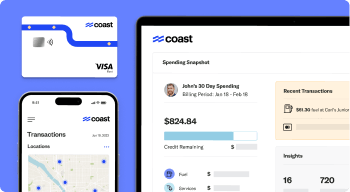Gathering and analyzing fleet data is essential if you manage a business that includes the use of cars, trucks, vans, or other vehicles as part of its daily activity.
Why is fleet data so important?
In this article, we answer that question and discuss the common types of fleet data that you can use to make your drivers, your team, and your business run better.
Table Of Contents
- Fleet Data Defined
- Common Types Of Fleet Data
- Why Fleet Data Is Important
- Focus On The Right Fleet Data
Fleet Data Defined

Fleet data is a large category of information that includes everything you can gather from vehicle telematics — the bulk of most fleet-data programs — as well as business-specific facts, figures, and statistics that apply to fleet operation.
And, as broad as that definition is, it’s just the tip of the fleet data iceberg. When it comes right down to it, if you can measure and analyze it, you can include it in your fleet data.
One issue that presents itself immediately as you delve deeper into the world of fleet data is the sheer volume of information available to you.
Studies have shown that modern telematics can generate more than 25 gigabytes of data every hour. To put that in perspective, just one gigabyte equals almost 678,000 pages of typed text.
Multiply that by 25, and you come up with almost 17,000,000 pages of typed text per hour. That’s a lot of data to analyze.
As we’ll discuss in more detail later on in this article, those numbers highlight the importance of gathering and analyzing the fleet data that will make your business more successful so you don’t get overwhelmed with pages upon pages of numbers.
To help you get a feel for the variables that apply to your business, here are the most common types of fleet data.
Common Types Of Fleet Data

1) Maintenance
Collecting fleet data can help you design and adhere to a preventative maintenance plan that will keep your business vehicles on the road longer.
How does this work?
First, the telematics installed on your cars, work trucks, vans, and semis monitor the condition of the vehicle.
Second, the fleet data recorded by those telematics gives you a precise indication of when it’s time to make necessary repairs so that the vehicles don’t develop larger problems and safety issues.
2) Usage
Analyzing fleet data is the perfect way to ensure that you’re using your vehicles in the best possible way.
Usage data can help you match the right vehicle to the right job by taking into account such variables as:
- Travel distance
- Type of freight
- Operational environment
- Deliveries per day
- Passenger count
Usage data can also show you which vehicles are being used more and for what purpose.
All of that information together makes it easier to design a program that puts each fleet vehicle where it can do the most good and be the most useful.
3) Driver Management
No driver management program would be complete without the fleet data to back it up. In fact, unless you ride with your drivers every day, you really won’t know if they are implementing and abiding by your policies and procedures.
Fleet data gives you that “first-hand” experience without you actually having to be in the vehicle with them.
The telematics hardware gives you access to a vast array of information about the vehicle and driving behavior, including:
- Position/location
- Speed
- Distance traveled
- Total mileage
- Trip time
- Idling time
- Harsh braking
- Rough driving
- Seat belt use
Armed with that fleet data, you can set performance and safety benchmarks that are specifically tailored for each of your drivers.
4) Fuel Consumption
When it comes to fleet data, few of the variables have as big — or as immediate — an impact on your bottom line as fuel consumption.
If you’re just getting started gathering and analyzing your fleet data, we suggest that this be the first variable you examine.
With this information in hand, and the insight it provides about vehicle condition and driver behavior, you’ll be able to design a program that can help reduce fuel consumption across the board.
5) Vehicle Acquisition
Vehicle acquisition is one of the first variables of fleet data that telematics doesn’t provide.
With a thorough analysis of your daily needs, you’ll be able to determine:
- The type and size of commercial vehicle that will best serve everyone involved (your business, your drivers, and your customers)
- The type and size of vehicle that will help you save on initial costs
- The type and size of vehicle that gets the best mileage but still has the power to get the job done
And, when you factor in the savings you can find from reduced registration, insurance, maintenance, and other variables, it’s easy to see how this fleet data variable can save your business money right off the top.
6) Resale
While vehicle acquisition is the first fleet data variable you’ll need, resale (or replacement) is the last.
Figuring out how and when to dispose of an old vehicle — and how that best dovetails with acquiring a new vehicle — can benefit your business by easing the transition and reducing the cost of leaving one tool behind and introducing another into the workflow.
The resale component of fleet data takes into account many other variables including maintenance information, usage statistics, and fuel consumption. As such, it’s one of the most all-encompassing data points on this list.
Why Fleet Data Is Important

1) Safety
The safety of your fleet, drivers, and those that share the road with them is job one. Analyzing fleet data is one of the primary ways your business can improve that metric across the board.
The information accumulated by vehicle telematics gives you insight into how to design safety programs tailored to your business.
2) Efficiency
Efficiency is defined as:
Achieving maximum productivity with minimum wasted effort or expense
Without fleet data, you’ll be fighting an uphill battle — and wasting a lot of effort and expense — to achieve hit-or-miss productivity.
Gathering and accumulating as much information as possible as it relates to specific fleet goals can help you improve efficiency by leaps and bounds.
3) Productivity
When your fleet operations run smoothly and efficiently, your drivers will be better equipped to be as productive as possible throughout the day.
For example, fleet data may show you that your technicians have too much to do in one shift, are rushing through jobs, and are driving recklessly to get to the next appointment.
With that information, you can control the number of jobs they have on their schedule each day so that they can spend the time necessary to conduct the high-quality work that’s indicative of your business.
4) Sustainability
You want to get the most out of the vehicles you have in service and help them last as long as possible before you have to replace them.
Digging deep into your fleet data often reveals steps you can take to make a single vehicle, or even a group of vehicles, more sustainable over the long run.
5) Fuel Cost Control
Whether it’s fleet data from the maintenance category, the usage category, or the driver management category, every piece of information can be used to implement fuel cost controls and reduce the overall amount of gas, diesel, or electric that your business uses.
That’s good for your bottom line, your business, and the environment.
Focus On The Right Fleet Data

As you’ve seen, even just one vehicle can produce a lot of fleet data. Instead of opening the floodgates, so to speak, and tracking every variable you can think of, it’s best to focus on the information that’s going to make your fleet more efficient and productive.
To do that, start by identifying the issues that are most relevant to your business.
For example, while safety is always a concern, it might not be a problem for your drivers. What may be of concern, though, is the fact that your fleet is aging and starting to break down more and more frequently.
In this case, your business would be better served by focusing on the fleet data that contributes to the prevention of breakdowns rather than complicating the matter by including safety data as well.
Concentrate on using the information you gather from vehicle telematics to address as few issues as possible (one or two at a time) so you don’t get inundated and overwhelmed with data.
Managing Your Fleet More Efficiently

Fleet data can only go so far toward helping you manage your fleet better. At some point, you need to start thinking about the “rubber-meets-the-road” policies, procedures, and tools your drivers use to get the job done right.
One of those tools is the Coast fleet and fuel card.
The Coast fleet and fuel card provides real-time expense tracking and a powerful online management platform that puts your entire fleet in the palm of your hand and provides full visibility of every dollar spent.
For more information, visit CoastPay.com today.


